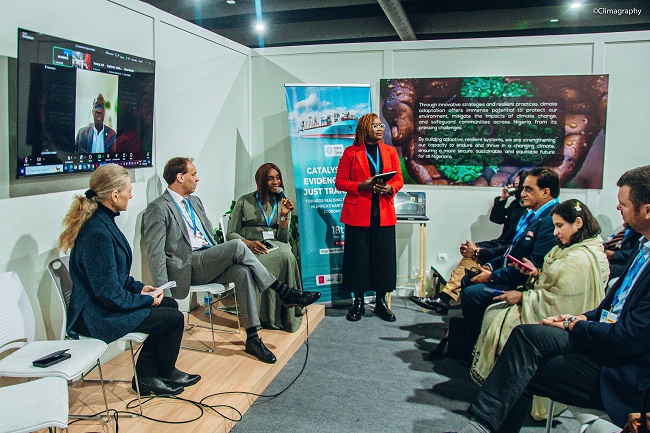As finance remained the focal point at the 29th United Nations Climate Change Conference (COP29), stakeholders in Africa’s maritime sector expressed concerns that the continent may miss crucial opportunities in the global marine industry without addressing its significant challenges.

During a marine and blue economy discussion, Dr. Dola Oluteye, Principal Investigator of University College London’s Leading Effective Afrocentric Participation (LEAP) project, in partnership with Nigeria’s Ministry for Marine and Blue Economy, organised a side event to explore the future of Africa’s maritime sector.
Hosted at the Nigerian Pavilion, the panel featured Dr. Dola Oluteye, Senior Research Fellow at University College London (UCL); Ms. Kidanua Gizaw from the African Development Bank (AfDB); Mr. Heaky Dimowo, Director at Nigeria’s Maritime and Safety Administration (NIMASA); Mr. Michael Mbaru of the Kenya Maritime Authority; and Mr. Stanley Ahorlu, CEO of Prime Meridian Docks, who participated remotely.
Mr. Mbaru opened the discussions by highlighting ongoing negotiations at the International Maritime Organisation (IMO) to reduce greenhouse gas (GHG) emissions in international shipping.
He noted, “Africa’s ship ownership represents about 2% of the global fleet supply, most of which is aging. This raises questions about our ability to retrofit existing fleets with new technologies and remain competitive.”
From the private sector perspective, Mr. Ahorlu stressed the importance of aligning maritime investments with climate goals to attract funding: “The private sector has a significant role to play in this transition. We need financial mechanisms that stimulate investment in maritime infrastructure.”
Dr. Oluteye emphasised the need for Africa to prioritise investments in green infrastructure and renewable energy projects to become a renewable energy supply powerhouse.
She pointed out the necessity for Africa to reimagine and reshape existing structures to improve the region’s production capabilities and capacity for both GDP growth and to manage, among other things, the transport cost increases associated with policy architecture under development by the International Maritime Organisation’s GHG Emissions Reduction Strategy. Stating that since over 90% of Africa’s trading relies on international shipping, it then becomes an economic imperative to strategically reshape existing regional trading, fiscal and environmental policies and systems.
Underscoring Africa’s abundant renewable resources (sun, wind, land, water) and youthful workforce as key assets, Dr Oluteye, “This is the era for a Green Industrialized Africa, powered by zero and near-zero emissions renewable energy sources, with potential to position Africa as a major supplier of renewable energy commodities.”
She immediately cautioned against the risks of promoting energy poverty due to highly extractive energy production models that puts Africa’s growth second. Rather, this reshaping of systems must strategically prioritise Africa’s growth above destructive extractive activities.
To foster progress, Dr. Oluteye advocates for “policy frameworks that support sustainable and green industrial practices, underpinned by policies that foster an enabling environment for private sector investment with partnerships with the public sector.”
She emphasises the need to engage policymakers to create a conducive regulatory environment in all sectors, especially the marine and blue economy sector.
Mr. Dimowo echoed this sentiment, calling for “innovative financing and strong regulatory frameworks” to drive advancement in Africa’s maritime industry. He also advocated for a continent-wide strategy starting with the African Union that aligns the efforts of African leaders under the African Union’s umbrella.
Ms. Gizaw highlighted the AFDB’s pivotal role in managing diverse climate-related funds to support green maritime initiatives and infrastructure development across Africa. She introduced the Climate Investment Fund (CIF), a multilateral initiative supporting climate-related actions in over 72 recipient countries.
Ms. Gizaw shared that the fund focuses on renewable energy, clean technology, and circular economy projects, with a specific Industry Decarbonisation Programme to address the shipping and maritime industry by providing concessional loans, grants, and technical assistance to promote green infrastructure and energy-efficient technologies.
In summary, while Africa faces numerous challenges in maximising its marine and blue economy, experts agree that with strategic investments in green infrastructure development combined with innovative policymaking, the continent can unlock its significant economic potential.
The Leading Effective Afrocentric Participation (LEAP) project, led by Dr. Dola Oluteye, aims to empower African nations by developing technical toolkit to promote a Just Transition and Sustainable Practices for Africa within the maritime sector. Partnering with regional governments and international organisations, LEAP focuses on technical development, capacity building, economic empowerment, technology sharing and inclusive advocacy to advance Africa’s marine and blue economy to achieve zero-emission operations.
By ‘Seyifunmi Adebote
